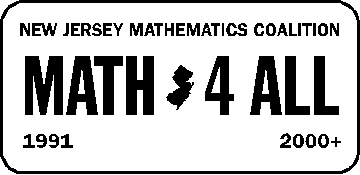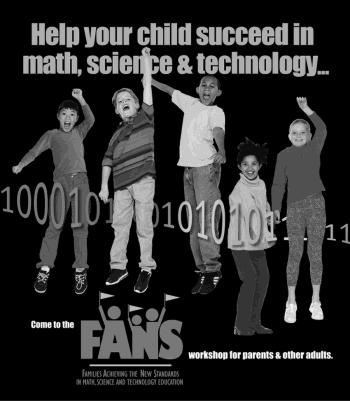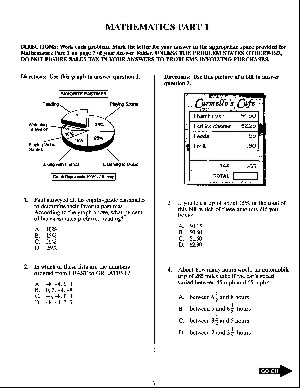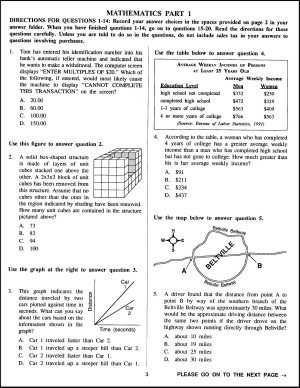|
Coalition UpdateIn this issue, we have a lot of news to report about the Coalition's activities. First, we are focusing on the FANS Project, which has had a very successful year. An article on the FANS Project appears on page 3. Our readers are encouraged to publicize the FANS Project and to schedule FANS Workshops in their schools, workplaces, and other sites in the community. Second, we are gathering information about the mathematics standards, in anticipation of the New Jersey Board of Education's review of the standards in 2000. More information about this review, and a questionnaire about the standards, can be found on pages 7-10. Third, we have developed ESPA workshops for teachers of grades 3 and 4. Workshops are being offered at specified sites and can also be offered in individual schools and districts. Fourth, during the past year, we have received major grants from the AT&T Foundation in support of the FANS Project, and from Johnson & Johnson and the Geraldine R. Dodge Foundation in support of professional development projects. This issue also contains an article comparing the statewide assessments in mathematics over the past twenty years. We have come a long way during the past two decades in terms of what we expect of our students. We anticipate that in the 2009, when we make a similar comparison, we will find a similar increase in both expectations and achievements of all students. BECOME AN AFFILIATE TODAY!For $25 You Can Help Us Implement Our ProgramsBecome an Affiliate of the New Jersey Mathematics Coalition. With your $25 contribution you will be joining with hundreds of others who are supporting the Coalition's efforts to improve mathematics education in New Jersey. Please join us in these important efforts. Just complete and mail the Affiliation Form. Please do it while it is fresh in your mind. Affiliates will receive a copy of Thank You Supporters!The New Jersey Mathematics Coalition is a collaborative effort of the education, business, government, and public sectors of the community working together to improve mathematics education in New Jersey. The Coalition and its projects are supported by:
New Jersey Mathematics Coalition
|
NASSMC LAUNCHES ELECTRONIC BRIEFING SERVICEThe National Alliance of State Science and Mathematics Coalitions (NASSMC) has initiated an information service designed to provide leaders in mathematics, science, and technology education (MSTE) with condensed reports on selected articles about MSTE appearing in the national press. The service is offered without cost through a grant from the National Security Agency. Twice a week, NASSMC Briefing Service (NBS) will provide abstracts of at most four articles on MSTE gleaned from the pages of the New York Times, Wall Street Journal, Washington Post, Chronicle of Higher Education, and Education Week. Each abstract will include a full reference (website and/or hardcopy) for persons wishing to read the entire article. This service is not available to individuals but as a member of the New Jersey Mathematics Coalition you can take advantage of this opportunity. All you need to do is let the Coalition know that you are interested in the service. We will add you to an e-mail list to which we will forward articles received from the Briefing Service. If you want to take advantage of this service, please send your name and e-mail address to Chris Magarelli, our mail list manager, at magarell@dimacs.rutgers.edu. |
Dodge Foundation and Johnson & Johnson Continue Their Support of Coalition's Professional Development Efforts
The mathematics standards will only be successful if teachers at all grade levels are provided opportunities to learn about the standards and how they can be implemented in the classroom. With this perspective in mind, the Coalition has made professional development an important focus of its recent efforts.
With the support of Johnson & Johnson over the past four years, the Coalition has sponsored summer programs in which teachers have developed standards-based workshops for their colleagues and then gone out and delivered those workshops around the state. Altogether 80 teachers have participated in these programs - twenty K-4 teachers in 1996, twenty 5-8 teachers in 1997, twenty 9-12 teachers in 1998, and twenty 3-4 teachers in 1999 (the latter group developed ESPA workshops, see article at right). These programs have significantly increased New Jersey's capacity to address the professional development needs for teachers of mathematics at all grade levels. And these 80 teachers have led hundreds of workshops on the standards.
With the support of the Geraldine R. Dodge Foundation over the past three years, the Coalition has focused on bringing professional development activities for mathematics teachers to the Abbott districts. In 1998 and 1999, workshop leaders trained in the J&J programs have given workshops for K-4 and 5-8 grade teachers in over twenty of the Abbott districts. The current grant from the Dodge Foundation is more ambitious. Coalition personnel will work with district supervisors to assist in developing professional development plans for the K-8 teachers in their districts, and K-8 teachers in the districts will be trained to provide workshops for their colleagues. The grant also provides for the training of additional workshop leaders for the ESPA workshops and 5-8 workshops developed in the J&J programs. Claire Passantino is serving as Program Director of this project, with the assistance of Debby Toti as Program Coordinator.
ESPA Workshops Available Through Coalition
The Coalition is now offering six half-day workshops for 3-4 grade teachers on the following topics:
- (E1) Number Sense
- (E2) Fractions and Decimals
- (E3) Measurement and Geometry
- (E4) Patterns and Algebra
- (E5) Creating, Displaying, and Analyzing Data
- (E6) Probability and Discrete Mathematics
Taken together these six workshops address all of the clusters on the Elementary School Proficiency Assessment (ESPA).
These workshops were offered for the first time on August 23-25 in Livingston, Piscataway, and Sewell, and will be offered again on October 25-27 on the Busch Campus of Rutgers University (Piscataway); the August workshops had a total attendance of 134.
Please inform your colleagues about these workshops - program and registration information can be obtained at http://dimacs.rutgers.edu/nj_math_coalition/workshops.html. These workshops will be repeated in the Spring and Summer of 2000.
These workshops are also available in individual schools and districts. If your school or district would like to have a trained workshop leader conduct one or more workshops for its teachers, please have the appropriate person call Program Coordinator Debby Toti at 732/445-2894 to discuss scheduling and fees.
The ESPA workshops are conducted by two groups of 3rd and 4th grade teachers. One group participated in the two-week ESPA Workshop Development Program, sponsored by the Coalition and funded by a grant from Johnson & Johnson. A second group participated in the one-week ESPA Workshop Training Program sponsored by the Coaltition and funded by the Geraldine R. Dodge Foundation. The Program Director for these programs was Paul Lawrence.
The ESPA workshops are based on the standards-based workshops developed in the summer of 1996 with an earlier grant from J&J. The topics on the new workshops are aligned with the ESPA clusters, as well as with the standards, and include discussion of ESPA-type questions developed for use in these workshops during the 1999 summer program.
The Coalition also offers workshops for K-2 teachers, for 5-8 grade teachers, and for high school teachers; information about these workshops can also be found at the website listed above or from Debby Toti at (732)445-2894.
AMTNJ is also sponsoring a full-day workshop on ESPA on December 1; see Calendar for details.
New Jersey's Statewide Assessment
Alignment with the Core Curriculum Content Standards
By Robert J. Riehs, Mathematics Specialist, Department of Education
In May 1996, the New Jersey State Board of Education formally adopted Core Curriculum Content Standards in seven academic areas and in workplace readiness. Since then, the New Jersey Department of Education, with the very active involvement of educators from throughout the state, has been working to align its statewide assessment system with those standards.
New Jersey's statewide standards-based assessment includes a new Elementary School Proficiency Assessment (ESPA), a new Grade Eight Proficiency Assessment (GEPA) to replace the Early Warning Test (EWT), and a new High School Proficiency Assessment (HSPA) to replace the High School Proficiency Test (HSPT).
New Jersey's first statewide assessment of fourth-grade students, including mathematics, language arts literacy, and science, took place during the Spring of 1998. All components of this test have been carefully aligned with New Jersey's Core Curriculum Content Standards.
The first operational form of the GEPA was administered to New Jersey's eighth-grade students in the Spring of 1999. This test contained mathematics and language arts literacy components, all of which were aligned with the Core Curriculum Content Standards.
Field-testing of HSPA items in mathematics and language arts literacy has begun. The proposed new Standards and Assessment for Student Achievement code, currently being considered by the State Board of Education, will include implementation dates for the first operational HSPA for juniors. Those New Jersey residents wishing to testify concerning the contents of this proposed code can request time at one of the following regional testimony sessions.
| Central Region | October 12 6:30 pm - 8:30pm | Raritan Valley Academy |
| Northern Region | October 19 6:30 pm - 8:30pm | Clifton High School |
| Southern Region | October 21 6:30 pm - 8:30pm | Atlantic County Vo-Tech |
For further information check the Department of Education's Home Page at http://www.state.nj.us/education/.
For most portions of the mathematics component of the ESPA, fourth-grade students have access to calculators. There is a section of that test, covering paper-pencil skills, estimation, and mental math, for which calculators are not used. For all portions of the mathematics component of the GEPA and the HSPA, students have access to calculators. For the HSPA, use of a graphing calculator is strongly recommended. In keeping with the practice of the EWT and HSPT, students taking GEPA or the will be provided with a reference sheet containing a standard set of formulas.
The greatest criticism of "teaching to the test" comes when what is tested is not highly valued by educators and parents. The intent, in developing this new generation of statewide assessments, has been to minimize the differences between what is valued for students and to know and be able to do, and what is tested.
Development of New Jersey's mathematics standards was made possible by the dedicated efforts of K-12 teachers, administrators, representatives of higher education, parents, and business representatives. The continued efforts of those stakeholders made possible the publication of the New Jersey Mathematics Curriculum Framework. The process of implementing New Jersey's mathematics standards has been and continues to be a group effort, of which all of New Jersey can be proud.
Assessment ResultsThe Department of Education announced on September 22 that 40% of the students taking ESPA were partially proficient, 44%were proficient and 16% were advanced proficient. On the GEPA, 38% were partially proficient, 43% were proficient, and 19% were advanced proficient. |
Second Annual K-12 Mega-Conference on Discrete MathematicsDecember 4, 9 am - 4 pm. Rutgers-New Brunswick |
|||
|
Core Curriculum Standards in Mathematics to be Reviewed!
Here's Your Chance to be Heard
The next three pages are a questionnaire about New Jersey's Mathematics Standards. We would appreciate your completing it and sharing with us your thoughts and suggestions.
As readers of this Newsletter certainly know, in May 1996 the New Jersey State Board of Education adopted wide-ranging sets of Core Curriculum Standards in seven different subject areas and also cross-content workplace readiness standards. Mathematics was one of the areas in which world-class standards were adopted and the Coalition was instrumental in their development and in the adoption process itself.
Many readers may not know, however, that the Board also indicated at the time of adoption that the standards would be reviewed in five years. As the time for that first review nears, the Department of Education is formulating plans for reviewing the standards before providing input to the Board. The Coalition has offered to be an active partner in the standards review process.
At its May meeting, the Coalition's Board of Governors adopted a Position Paper providing recommendations to the Department of Education about what should be included in this review. In the Position Paper, the Coalition asserts that changes should not be made lightly, that standards-based reform is a long-term process and that we must be patient to allow the process to achieve its potential rather than rush hastily into changes that may seem warranted but are based only on a few years' experience. We must remember that the first cohort of New Jersey students to finish a K-12 education in a completely standards-based era will graduate in 2010.
On the other hand, clear and obvious problems with the standards should certainly be addressed as soon as possible. In order to gather data to begin to identify such problems, the Coalition Board recommended twenty types of activities under the following five categories:
- Solicit comments about the content of the standards from teachers and supervisors.
- Develop information about standards implementation in order to shed light on the standards themelves.
- Compare the standards with other similar documents and recommendations.
- Determine the impact of the standards on New Jersey's colleges.
- Review and revise the text of the standards to make them more usable.
The task of reviewing the standards is a large one and to do it properly will require time and effort on the part of many of the state's educators. We ask you to be among the first to offer feedback on the standards by filling in the questionnaire in this pull-out section of the Newsletter. Its various questions provide a very open-ended way for you to let us know whether you think the math standards need modifications at this point in time and, if so, what modifications you suggest. Please take the time to do a thoughtful job. We will make sure that your voice is heard.
Click here to respond to the questionnaire. Thanks for your help.
We've Come A Long Way
By Karin Rupp, Mathematics Consultant
Statewide testing of students in New Jersey public high schools began in the late 1970s. The Minimum Basic Skills (MBS) Tests were given to both 9th and 11th graders in reading and mathematics. Most of the mathematics problems (see Figure 1) were single-step problems and required virtually no reading or problem-solving skills. Moreover, the two tests were similar; in 1979-1980, 12 of the first 15 questions on the 9th grade test also appear on the 11th grade test.
Although at the time many high school teachers thought that the mathematics tests were too difficult for most students, now these tests seem more appropriate for the 4th or 5th grade. Nevertheless, in the first few years, there were very few high schools where more than 70% of the students scored well on these tests. The MBS Grade 9 Test continued without major change until the late 1980s, but the Grade 11 Test was given for only a few years.
The MBS Grade 9 Test was replaced by the High School Proficiency Test (HSPT). This test for 9th graders was harder; it no longer had questions involving operations with whole numbers, and it included a significant amount of problem solving and also, therefore, higher reading skills. Sample questions from this test appear in Figure 2. This test was last given to 9th graders in the early 1990s, and was therefore still the graduation requirement until about 1994.
Figure 1
Following are the first ten questions on the 1979-80 Grade 9 MBS, reformatted for reasons of space. Note that each question was "multiple choice".
1. 432 + 506 =
2. Round 74,623 to the nearest thousand.
3. 754 - 23 =
4. 7 x 0 =
5. 7/9 - 2/9 =
6. 725 - 378 =
7. Which of the following [445, 477, 589, 750] is
an even number?
8. 670 divided by 5 equals
9. 2,361 + 23 =
10. 3 3/5 x 25 =
Following are the last five questions (also multiple choice):
91. What is the price of a $7.00 record album after
a 20% discount?
92. If the bush in the picture above is 5 feet tall,
about how tall is the flagpole?
93. If 84 + N = 84, then N =
94. In 1976, 800 pounds of candy could be purchased
for $.70 per pound. In 1977, the cost per pound
was $1.10. What was the difference in cost for
the 800 pounds of candy?
95. Which of the following is a measure of weight?
[centimeter, kiloliter, degree, gram]
Figure 2
Following are the first ten questions on the 1984-85 HSPT, reformatted for reasons of space. Note that each question was "multiple choice".
1. 1/6 + 2/5 + 1/3 = 2. 7/10 - 2/3 = 3. 1/5 + 2/10 - 3/10 = 4. 24 x 3/8 = 5. 4 divided by 1/3 equals 6. 12 + 2.04 + 5.3 = 7. 7.14 x 0.09 = 8. 2.568 divided by 2.4 equals 9. 15% of 60 = 10. 20 is what percent of 80?
Following are the last five questions in Part 1 (also multiple choice):
31. Juan studied from 6:15 p.m. to 9:45 p.m. on
Monday, Tuesday, and Wednesday. He studied
from 7:30 p.m. to 9:00 p.m. on Thursday. What
was the total amount of time Juan spent studying
these four days?
32. Sue had 8 bills in her wallet. She had 4
one-dollar bills, 3 five-dollar bills, and 1
ten-dollar bill. If she took one bill out of
her wallet without looking, what is the
probability that it would be a five-dollar bill?
33. Helen drove 28 miles on Monday, 35 miles on
Tuesday, 14 miles on Wednesday, and 43 miles on
Thursday. What was the average number of miles
she drove per day?
34. If Tom walked 15 miles in 3 hours, how long would
it take him to walk 25 miles at the same rate?
35. Paneling costs $1.60 per square foot. How much
will it cost to buy 2 pieces of paneling if each
piece is 4 feet wide and 8 feet long?
In the early 1990s, the new High School Proficiency Test (HSPT-11), now for 11th graders, and the Early Warning Test (EWT) for 8th grade students, were instituted. These tests, which remain in effect today, require a great deal of reading and require multi-step problem solving. See Figures 3 and 4; the examples given are from 1992 since later tests were not released.
As is evident, we have come a long way over the past 20 years, first in terms of our expectations, and then in terms of student performance. Whenever changes were first instituted, there was much opposition and concern, and students generally were not too successful. However, as schools' programs were realigned and appropriate changes were made in the curriculum, student performance improved. As expectations increased, curricula were revised, and student performance improved.
The HSPT-11 and EWT will soon be phased out in favor of the standards-based High School Proficiency Assessment (HSPA) and Grade Eight Proficiency Assessment (GEPA). A new test for 4th grade students, the Elementary School Proficiency Assessment (ESPA) is already in place (see article).
Again, we anticipate that concerns will be raised, as they were in the past, about whether all students can achieve the new standards and perform successfully on these assessments. But we should be confident that, as in the past, schools will increase their expectations and students will rise to the occasion.
Figure 3 |
Figure 4 |
AFFILIATION FORM
NAME:_______________________________________________ INSTITUTION:___________________________________ ADDRESS:______________________________________________________________________________ ZIP:__________ PHONE: ( ) _____________________ email: ____________________
Yes, I would like to become an Affiliate of the Coalition. Enclosed is a check for $25 payable to Rutgers University - NJMC.
Please return to: NJ Mathematics Coalition, P.O. Box 10867, New Brunswick, NJ 08906
Calendar of Events
Fall 1999
October 14. 3:00 pm - 6:00 pm.
New Jersey Mathematics Coalition Board of Governors Meeting.
Educational Testing Service (ETS), Rosedale. Call Debby Toti at
732/445-2894 for more information.
October 20-21. 8:00 am - 2:30 pm.
Reforms in Math (7-12) Conference. Robeson Campus Center,
Rutgers-Newark. (October 20 open only to math teachers from Newark
Public Schools.) For more information call 973/733-7035 or 7572.
October 20, 21, 22.
Interactive Mathematics Program (9-12). One-day awareness sessions.
Rowan University (10/20), Rutgers University (New Brunswick) (10/21),
County College of Morris (10/22). Call Anne Haisch at 732/932-7425
for more information.
October 21-22.
Standards-based Family Math Extension. Two-day workshop for K-6
teachers (20% discount for Newsletter readers). Busch Campus Center,
Rutgers-New Brunswick. For more information call Rosa Salinas at
732/445-1284.
October 25-27.
Standards-based ESPA Workshops (3-4). Six individual half-day
workshops on the ESPA strands (see article). Call Debby
Toti at 732/445-2894 for more information.
(http://dimacs.rutgers.edu/nj_math_coalition/workshops.html)
October 27-28.
MathScapes (Middle School) and Manipulatives (Elementary School).
Awareness sessions. Central and Northern New Jersey. Locations to be
announced. Call Pat Toci at 732/445-2249 for more information.
October 28. 5:00 pm - 9:00 pm.
Annual Business Meeting of AMTNJ (Association of Mathematics Teachers
of New Jersey). Jamesburg Holiday Inn ($20 for dinner). Call Nancy
Schultz at 973/790-6184 for more information. (http://www.amtnj.org)
November 5-6.
Investigations in Number, Data, and Space. Institute on Exploring
Data. Rutgers-New Brunswick. Call Anne Haisch at 732/932-7425 for
information.
November 11-12.
National FANS Conference. Rutgers-New Brunswick. Call Jennifer
Lomench at 732/445-2894 for further information.
November 17. 8:30 am - 3:30 pm.
Experience Building Bridges: A model for integrating science, math,
and technology. The College of New Jersey. Call Robert Weber at
609/771-3384 for information.
November 17, 18, 22.
Family Math. Three-day workshop. Busch Campus Center, Rutgers-New
Brunswick. Call Rosa Salinas at 732/445-1284 for information.
November 18-19.
Interactive Mathematics Program (9-12). Two-day workshop. Rutgers
University (New Brunswick). Call Anne Haisch at 732/932-7425 for more
information.
December 1.
ESPA Conference of AMTNJ (Association of Mathematics Teachers of New
Jersey). Doubletree Hotel. Somerset. Call Nancy Schultz at
973/790-6184 for more information. (http://www.amtnj.org)
December 2-3.
Annual Conference of AMTNJ (Association of Mathematics Teachers of New
Jersey). Doubletree Hotel. Somerset. Call Nancy Schultz at
973/790-6184 for more information. (http://www.amtnj.org)
December 4. 9:00 am - 4:00 pm.
Second Annual K-12 Mega-Conference on Discrete Mathematics.
Activities for teachers at all K-12 grade levels. Activities for high
school students. Rutgers, New Brunswick. For further
information, call Bonnie Katz at
732/445-2810. (http//dimacs.rutgers.edu/k12-mega-conference/)
Check the NJ SSI Calendar for additional information on these and other activities.
(http://dimacs.rutgers.edu/~njssiweb/calendar)
1998 National Recipients
Presidential Awards for Excellence in Mathematics and Science Teaching
The National Science Foundation recently announced the following winners of the 1998 Presidential Awards for Excellence in Mathematics and Science Teaching. Congratulations to the winners.
Secondary Mathematics Elementary Science Denise Marie Grippaldi Daniel Brian Weissman Edison High School M. E. McKeown School Edison Newton
Their schools receive grants of $7,500, to be spent under the awardee's direction over a three-year period to improve school mathematics or science programs. In addition to various gifts, awardees receive an expense-paid trip to Washington, D.C., for a series of events including an awards ceremony attended by the President.



